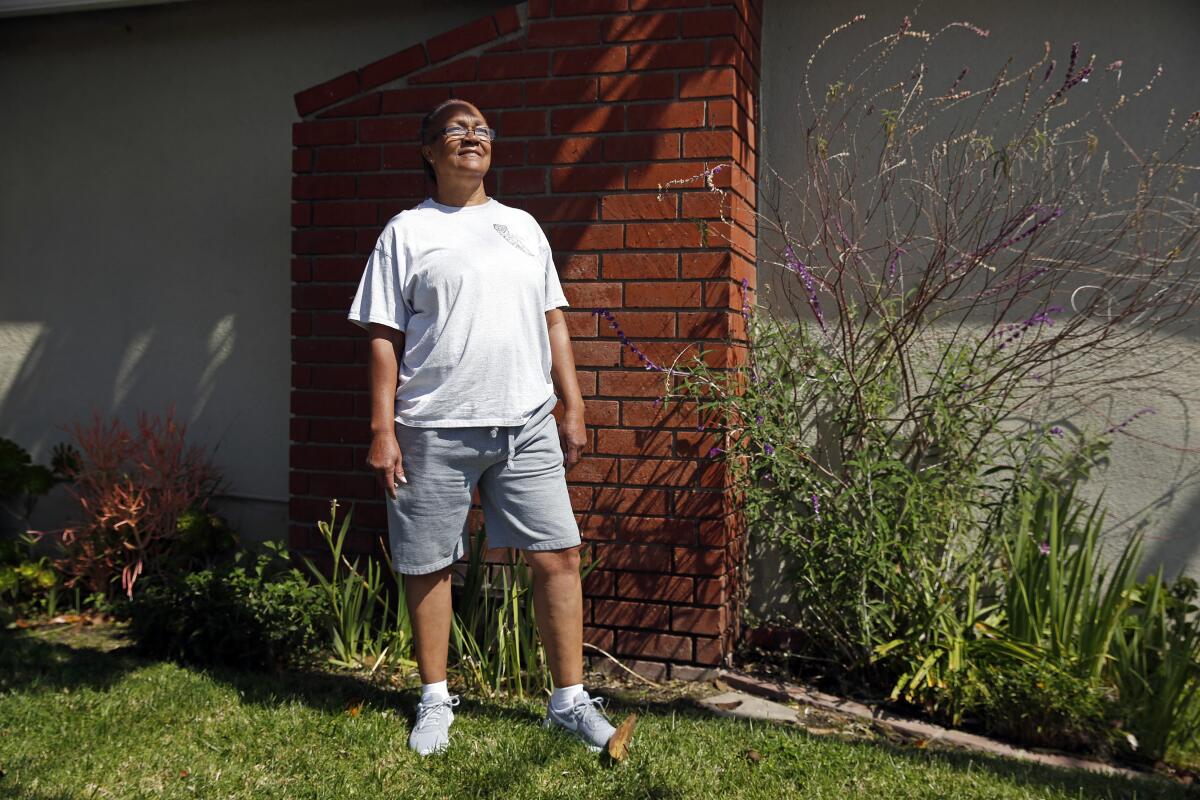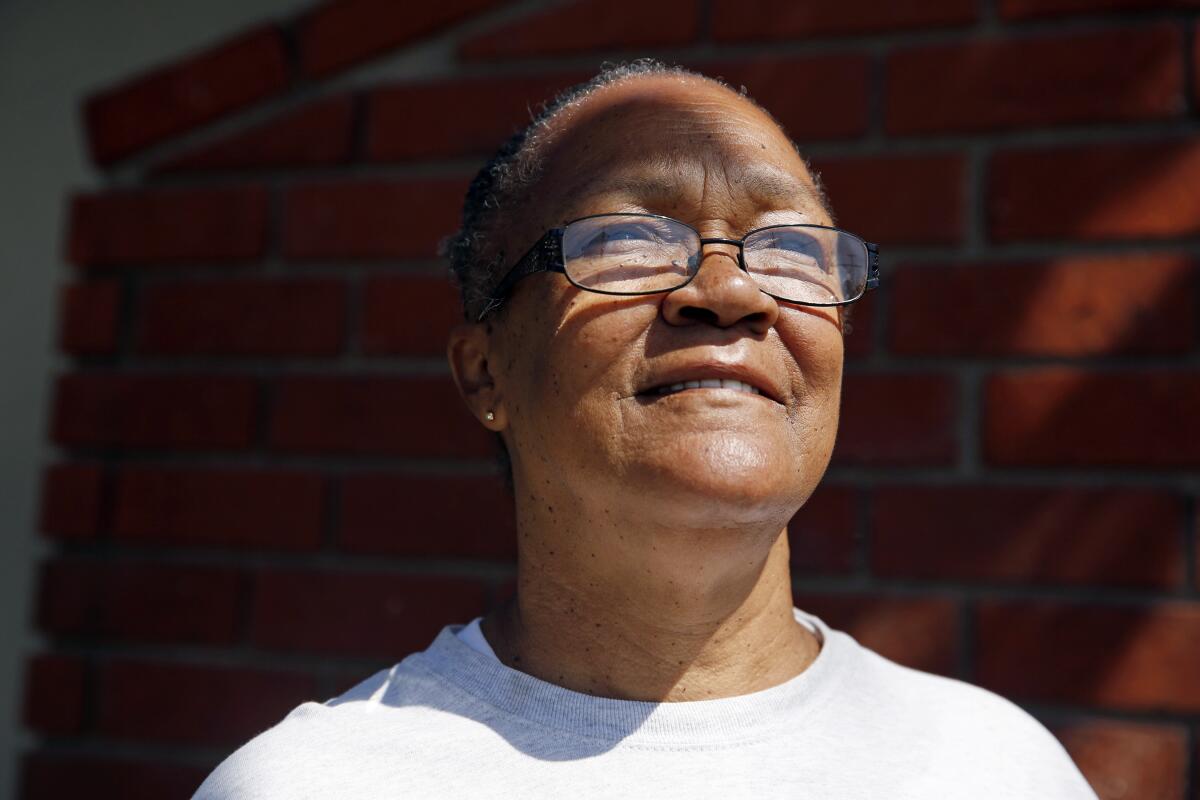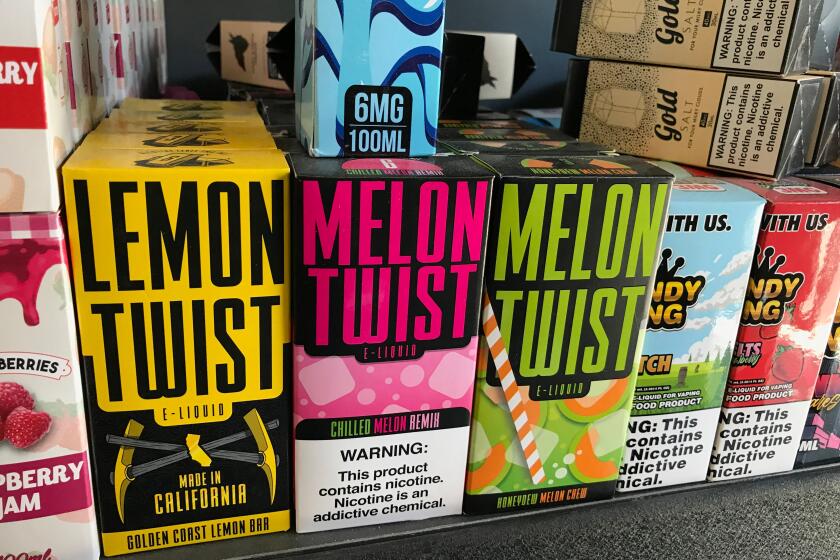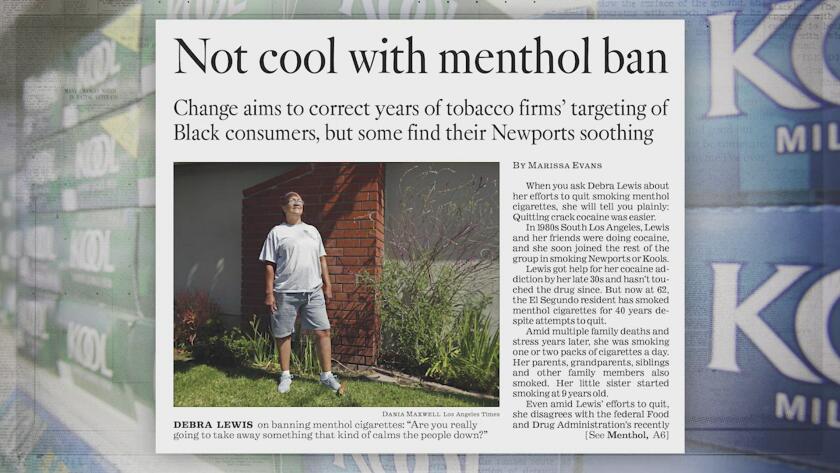Addicted to menthol: Big Tobacco’s targeting of Black communities could soon end

The proposed menthol cigarette ban highlights longtime racial inequities of one of the most stigmatizing public health issues in American society.
When you ask Debra Lewis about her efforts to quit smoking menthol cigarettes, she will tell you plainly: Quitting crack cocaine was easier.
In 1980s South Los Angeles, Lewis and her friends were doing cocaine, and she soon joined the rest of the group in smoking Newports or Kools.
Lewis got help for her cocaine addiction by her late 30s and hasn’t touched the drug since. But now at 62, the El Segundo resident has smoked menthol cigarettes for 40 years despite attempts to quit.
Amid multiple family deaths and stress years later, she was smoking one or two packs of cigarettes a day. Her parents, grandparents, siblings and other family members also smoked. Her little sister started smoking at 9 years old.
Even amid Lewis’s efforts to quit, she disagrees with the federal Food and Drug Administration’s recently announced plans to renew efforts to ban menthol cigarettes.
She said her job as a live-in aide for people with intellectual disabilities is stressful and the ban doesn’t consider other items people use, such as weed or alcohol. Reaching for a cigarette, “it seems like all of my cares is lifted away at least for the moment, till the cigarette burns out.”
“Are you really going to take away something that kind of calms the people down?” Lewis said. “If you take something that calms my nerves, what am I going to replace with it?”
The FDA’s potential ban is years away but highlights longtime racial inequities of one the most stigmatizing social habits and public health issues in American society. Bright-colored advertisements for Newport and Kool menthol cigarettes are normal sights at convenience stores and gas stations in predominantly Black neighborhoods.
Tobacco companies have faced decades of criticism for targeting the cool mint flavor of menthol products to Black people who smoke. And Black consumers who stand to be most affected by the changing policies are often left out of the conversation.
The FDA’s recent announcement was a long-sought win for anti-smoking groups and health advocates nationwide who filed a petition to force the agency to resurrect the process.
Advocates say a ban would curb smoking among communities of color, particularly Black consumers, who are more likely to smoke menthol products. But tobacco companies and other groups have denounced the potential ban as being discriminatory for targeting products consumers of color often buy.
FDA aims to propose banning menthol cigarettes after health groups have sued to force a decision on the mint flavor popular with Black smokers.
Opponents of the ban, including the American Civil Liberties Union, argue it could lead to law enforcement agencies targeting Black consumers peddling lone menthol cigarettes. They invoke the memory of Eric Garner, who died in 2014 when a police officer put him in a chokehold in New York after he was seen selling loose cigarettes.
The counterpoint has outraged public health advocates and raised concerns about fear-mongering and misinformation campaigns.
The “political interference and power and might of the tobacco industry” is why the ban has faced delays, said Carol McGruder, a founding member and cochair of the African American Tobacco Control Leadership Council.
The California-based group focuses on reducing smoking in Black communities and is one of the organizations leading the charge for the ban. McGruder said allowing menthols to be sold is not a solution for police brutality.
“When people say there’s a preference or affinity [for menthol cigarettes], it’s very offensive,” McGruder said. “When they take the real issue of racism and police brutality and flip it on its head to protect themselves so they can continue to be the biggest profiler and killer of Black people ... hands down there’s no question the damage they do.”
A spokeswoman for Reynolds American, maker of Newport and Kool menthol products, said in an email statement the company would submit “robust, science-based evidence” during the federal rule-making process.
“As was true when the FDA first examined menthol in 2013, and as the published literature continues to demonstrate, there is no scientific basis to regulate menthol and nonmenthol cigarettes differently,” she said.
In the U.S., federal public health officials estimate nearly 18.6 million people smoke menthol cigarettes.
Among all smokers, nearly 85% of Black people smoke menthol cigarettes. Only a third of white people who smoke use the same product. Research has found the products hide the burning sensation giving people who smoke them a false sense of how hard to quit they are. Between 2011 and 2018, the FDA noted declines in menthol cigarette use among non-Hispanic white youths but not among non-Hispanic Black or Hispanic youths.
Previous research has also found that a disproportionate number of storefront advertisements and price promotions for menthol cigarettes were in predominantly Black neighborhoods. Those stores also often had the lowest advertised prices.
Cigarette smoking kills more than 480,000 people per year in the United States, including more than 41,000 deaths from secondhand smoke exposure, according to the federal Centers for Disease Control and Prevention.
“For far too long, certain populations, including African Americans, have been targeted, and disproportionately impacted by tobacco use,” Mitch Zeller, director of the FDA’s Center for Tobacco Products, said in a news release. “Despite the tremendous progress we’ve made in getting people to stop smoking over the past 55 years, that progress hasn’t been experienced by everyone equally.
Under the Obama administration, the 2009 Tobacco Control Act left menthol cigarettes as the only flavored cigarettes still marketed in the U.S. While the FDA studied the issue, use of flavored cigars increased dramatically. The ban would also include menthol-flavored cigars and cigarillos.
Under the ban, the FDA said it would be for manufacturers, distributors, wholesalers, importers and retailers. The agency would not go after individuals who have or use the product.
California lawmakers approved legislation last year banning menthol cigarettes and other flavored tobacco, but the law is suspended until voters decide in November 2022 whether to uphold or repeal it. Tobacco companies rallied to get a referendum on the rule.

Lewis once quit smoking after foot surgery when she was unable to go outside to smoke. That lasted four years until the pain of another medical procedure spurred her to reach for her cigarettes again. She currently smokes about five cigarettes a day.
Her sister, who quit smoking years ago, has signed her up for various smoking cessation classes and encouraged her to use mints or chewing gum. Lewis said she beat the odds with her drug addiction, but quitting cigarettes is harder than people realize.
“I know a lot of people when they got clean they were smoking cigarettes and they would say ‘you ain’t clean if you’re smoking cigarettes,’” Lewis said. “Then a few of them after a while they quit smoking, but the majority that quit smoking they had an illness that made them quit.”
California’s ban on the sale of flavored tobacco products is suspended after a referendum by the tobacco industry qualified for the 2022 ballot.
The state’s adult cigarette smoking rate has declined dramatically over 30 years, according to a 2019 report from the California Department of Public Health’s Tobacco Control Program. But millions of Californians still use tobacco products over the course of a month.
For 2020-21, the California Department of Public Health has a $27.3-million budget for smoking cessation efforts in the state, up more than 50% from the previous year.
“Some people say tobacco use is a disease ... how can you just quit a disease?” said Karen Beard, a psychologist who works with the African American Tobacco Control Leadership Council. She said smoking cessation often lacks compassion and understanding.
“We have work to do trying to reframe the experience,” Beard said. “It’s not about quitting, it’s about committing, it’s not about will power, it’s about being willing to be uncomfortable, it’s not about giving up, it’s about what you’re going to get.”
Lewis, who attended a smoking cessation class Beard recently taught, said she’s focused on a key question from the class: How would you reward yourself by not smoking?
Lewis wants to use money she would save from not buying cigarettes to take a trip to see her cousin in Jonesboro, Ga. Knowing she doesn’t need a self-imposed deadline to quit has eased her stress.
She’s working to keep her cigarettes out of sight and to find stress exercises she can do. But she wishes she had someone to formally coach her when she wants a cigarette.
“Sometimes I feel an obligation, too, since I am the matriarch of my family,” Lewis said. “My grandmother always told me when she passed she said she’s not worried about me, I’m going to be all right, she was worried about my siblings and the rest of my fourth generation.”
Lewis’s current goal is to get down to three cigarettes a day by mid-June. And then down to two. And then one. And then, hopefully, none.
Watch L.A. Times Today at 7 p.m. on Spectrum News 1 on Channel 1 or live stream on the Spectrum News App. Palos Verdes Peninsula and Orange County viewers can watch on Cox Systems on channel 99.
More to Read
Sign up for Essential California
The most important California stories and recommendations in your inbox every morning.
You may occasionally receive promotional content from the Los Angeles Times.














